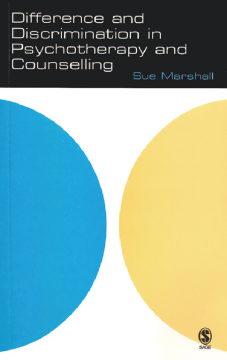
Additional Information
Book Details
Abstract
'Prejudice is, for good or ill, a part of our nature. It is instilled in us from birth onwards. All we can hope to do is to combat it, and the first tool in our armoury must be that of awareness. Without this, it is very difficult, perhaps impossible, for the psychotherapist or counsellor to explore how it might be influencing the psychotherapy relationship.
Sue Marshall has, in this book, performed a valuable task in that direction, and has done in it very cogently in a most difficult area. I applaud her' - Joe Sinclair, Nurturing Potential
Difference, prejudice and discrimination are issues which all counsellors and psychotherapists need to address as part of their personal and professional development. Designed to support training on these complex issues, Difference & Discrimination in Counselling & Psychotherapy helps therapists understand the experience of discrimination, as well as explore their own - often unconscious - attitudes to others, based on gender, sexuality, race, culture or mental health.
For most therapists an attitude of acceptance and non-judgmentalism is fundamental to their view of practice. However, in seeking to be non-judgmental, therapists may run the risk of concealing their own prejudices. It is only by facing up to these attitudes and exploring them that therapists are able to fully relate to their clients and help them effectively. Synthesising sociological knowledge with her experience of a practitioner, Sue Marshall powerfully demonstrates both the importance and the practicalities of developing awareness about difference.
Difference & Discrimination in Counselling & Psychotherapy offers a straightforward approach to some of the most difficult issues relating to practice, making it an ideal text for use in training and for qualified therapists continuing their professional development.
Table of Contents
| Section Title | Page | Action | Price |
|---|---|---|---|
| Prelims (Contents, Figures, Tables, Boxes, Forword by Sunil Kumar Manandhar, Forword by Shoko Noda, Forword by Dinesh Chandra Devkota Preface by Veerle Vandeweerd, Acknowledgements, About the Authors, Abbreviations, acronyms and conversion units, Executive Summary) | |||
| 1. Introduction | |||
| 2. Methodology | |||
| 3. Electricity access accelerates achievement of the MDGs in rural areas | |||
| 4. Policy implications and conclusions | |||
| Back Matter (Annexes 1 - 10, Endnotes, References) |
